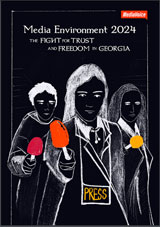
Study Warns of Rising Repression and Media Censorship in Georgia Amid Election Year
By Liza Mchedlidze
Thursday, March 27, 2025
A new study, "Media Environment 2024: The Fight for Trust and Freedom in Georgia," has revealed an alarming deterioration of press freedom in the country, linking the passage of the Foreign Agents Law to increasing media censorship, intimidation, and self-censorship.
The study, conducted by independent researchers under the Media and Communication Educational and Research Center's Media Voice project, assesses the media landscape in Georgia's "super-election year" and examines how political pressure has reshaped journalistic work.
One of the study's key findings is that the Foreign Agents Law-widely referred to as the "Russian Law" by critics-was instrumentalized by the ruling Georgian Dream (GD) party as part of a pre-election strategy to divert media focus away from election-related issues.
"During the pre-election period, the media failed to ask critical questions and did not/could not investigate them," the study states.
According to the report, GD's reintroduction and adoption of the law created an information vacuum by monopolizing media attention, pushing election topics off the agenda, and draining journalistic resources. As a result, critical media entered a defensive and survival mode, with journalists facing physical, psychological, and legal exhaustion.
The study documents a sharp increase in aggression against journalists, both online and offline, particularly from GD-affiliated violent groups. It notes that journalists have been stigmatized as "agents", harassed on social media by organized troll networks, and physically attacked-particularly in regional areas.
"The election environment became toxic for regional media," the report warns.
It also highlights a troubling rise in self-censorship, as reporters struggled to access public information and sources became increasingly reluctant to speak. Even pro-government media expressed concerns over restricted access to information.
A particularly alarming finding is that not only journalists, but also their family members, have been targeted with violence following the law's passage. The study links this directly to the Georgian Dream government's rhetoric, accusing it of encouraging violence against the press.
"Brutal beatings of media professionals were broadcast live, contributing to the normalization of violence and criminal activity," the study states, adding that such crimes against journalists have been treated with impunity and downgraded to minor offenses like hooliganism.
Compounding the crisis, the study notes that international media donors have withdrawn from Georgia, forcing local outlets to prioritize survival over investigative journalism and development. The greatest challenge now, it says, is ensuring the physical, digital, and psychological safety of journalists.
The study paints a bleak picture of Georgia's media environment in 2024, concluding:
"Journalists note that such a repressive media environment has never been seen under any government."

